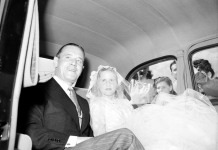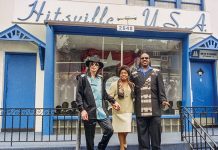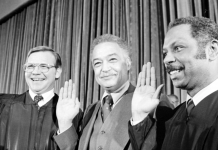
It’s a pretty safe bet that when the new year rolls around on Jan. 1, 2021, few will shed any tears about the passing of 2020, a year of a deadly pandemic and the concomitant dark theaters, silent concert halls, empty sports arenas, limited social interaction, closed schools, and police brutality protests. One could say we need a break. With a new year springs fresh hope.
On the Jewish calendar, the new year, Rosh Hashanah, rolls around even earlier, beginning this year at sundown on Friday, Sept. 18, and concluding at sundown Sunday, Sept. 20. It’s a time of celebration, yes, but also of repentance and reflection, leading to Yom Kippur, the holiest day in Judaism, which begins this year on the evening of Sept. 27.
Perhaps these worshippers at Beth David (“House of David”), in the thick of the Great Depression, also looked forward to a sunnier new year as they congregated for Rosh Hashanah services on the evening of Sept. 9, 1934. Detroit Tigers fans also will remember this as a time when Hank Greenberg struggled with his conscience over whether to play the next day, when the Tigers were in a heated pennant race. In the end, he did play, smashing two home runs as the Tigers topped the Boston Red Sox, 2-1, but Greenberg refrained from playing several days later on Yom Kippur.
Beth David was located at Elmhurst and 14th streets in what was then a predominantly Jewish enclave. Jewish Detroit, by Irwin J. Cohen, notes that the Moorish-style synagogue opened in 1928, but the congregation was much older, having been founded by Russian immigrants in 1892, according to michjewishhistory.org. Its first rented house of worship was at Hastings and Gratiot. It dedicated its first edifice in 1900 on Adelaide.
Sadly, Beth David went bankrupt in the Depression and lost its rights to its appellation, so it was renamed B’nai David (“Children of David”). In the late 1950s, the congregation moved to Southfield, and its old building was sold to the Mt. Zion Missionary Baptist Church.
|
|
|









